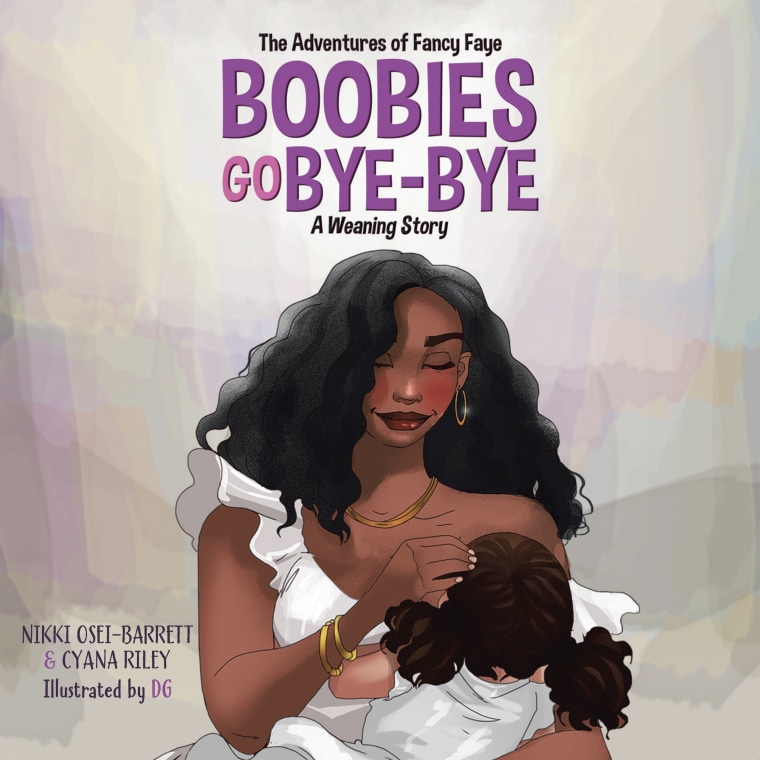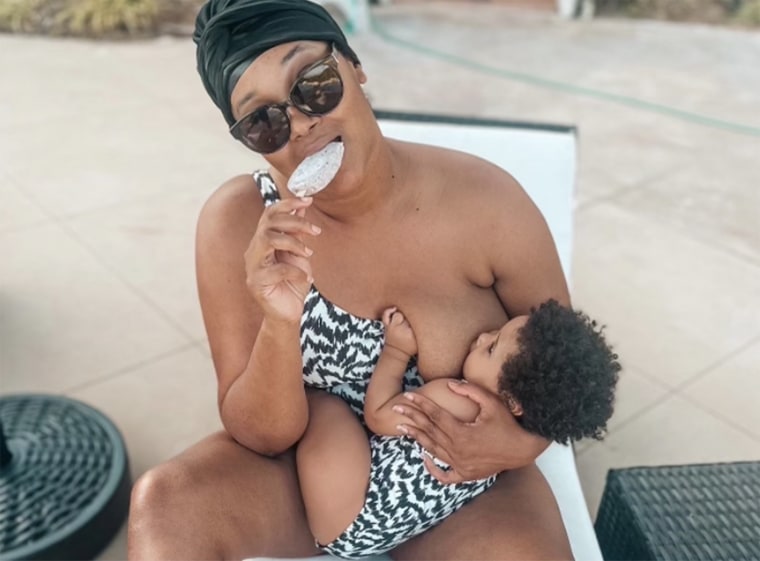When Krystal Duhaney, a registered nurse and lactation consultant, founded her breastfeeding-support company, Milky Mama, in 2015, she was afraid to show her face.
“I thought that if people saw that I was Black, I’d starting losing customers,” Duhaney, 37, told TODAY Parents. “Then one day, I was like, 'OK. I’m just gonna do it, and see what happens.’”
Duhaney went live on Facebook and introduced herself as a mother — she now has three children — and shared her own struggles with nursing. She encouraged viewers to ask questions.
“I was fearful — I really was, and that makes me sad. But the response was wonderful,” Duhaney said. “And it lit a fire under me. I realized I had this incredible opportunity to break some barriers and change the narrative on Black breastfeeding.”
Duhaney shared tips on positioning and how to soothe sore nipples on social media. Seven years later, she has nearly one million followers between Facebook and Instagram.
“Representation matters,” Duhaney said. “It’s important to see Black women breastfeeding their babies.”
The history of breastfeeding and slavery
In the United States, Black women have the lowest breastfeeding rates of any racial or ethnic group at 69.4%, according to the Centers for Disease Control and Prevention (CDC). On average, Black women also breastfeed for the shortest period of time, compared to other racial and ethnic groups.
Researchers from the CDC released a study in 2019, that found hospitals serving larger Black populations are less likely to offer lactation support following delivery. Black mothers are also more likely to receive in-hospital formula than white mothers, according to the CDC.
Breastfeeding has health benefits for both babies and mothers; it lowers the baby’s risk of SIDS, heart disease, lymphoma, asthma and diabetes, among other issues. But Duhaney said that after she welcomed her first child in 2012, no one offered her any information about breastfeeding.
"I was having a really tough time and the pediatrician was like, 'Oh, just give him formula. He didn't refer me to a lactation consultant — it was just 'give formula,'" Duhaney recalled. "Now, there's nothing wrong with formula. I was formula-fed and I turned out fine, it's just not what I wanted to do."
Duhaney said none of her older relatives had breastfed.
“I think one of the reasons is that they didn’t have support. My experience in breastfeeding — and health care in general — is that Black women are often dismissed,” she explained. “Then, there’s historical generational trauma.”
Duhaney noted that many slaves were forced to breastfeed their owner’s children at the expense of their own.
“Their own babies would often die,” Duhaney said. “That trauma passed on generationally, has really diminished our desire to breastfeed.”
New data shows that racial gaps in breastfeeding are getting smaller. The CDC reported that 59% percent of Black mothers said they breastfed in 2008, compared to 47% in 2000, a marked increase.
"We still have a ways to go," Duhaney said. "But I'm hopeful."
Fallon Smalls, a certified breastfeeding specialist in Maryland, is also optimistic.
Smalls told TODAY that Duhaney inspired her career path.
“The way she talks — she chooses her words so carefully — you never feel judged,” Smalls, 30, said. “And it’s important for Black moms to see women in the lactation field that look like them. The first time I saw her, I was like, 'Wow.' This is pretty cool.'"
Breaking breastfeeding stereotypes
Nikki Osei-Barrett and Cyana Riley are on a similar mission to normalize Black women breastfeeding. Last year, the two friends co-authored the children’s book, “Boobies Go Bye-Bye,” a tale inspired by their personal experiences with weaning.
Osei-Barrett, 38, and Riley, 39, both practiced extended breastfeeding, which is defined as nursing past a baby’s first birthday.
“There’s so much shame in the Black community about extended breastfeeding,” Riley told TODAY. “I have friends that breastfeed only at night because they don’t want anyone to see. You get so many comments and looks."

Osei-Barrett, who shared her weaning journey on social media in 2020, would regularly receive messages from Black mothers thanking her for the representation. The feedback, she said, inspired “Boobies Go Bye-Bye.”
“The story is told from the point of a view of a mom, but we used language a kid can understand,” Osei-Barrett explained. “Like, 'Mama has Band-Aids on her boobs because you’re a big girl now and can drink milk out of your big girl cup.'"

In the book, the mother is shown wearing ensembles like a white sundress and and strappy platform sandals.
“It’s important for people to see that Black women breastfeed, Black women do extended breastfeeding. And they wear beautiful clothing and jewelry while they’re breastfeeding,” Riley said. “I think there’s also a positioning about how Black mothers look. We were very intentional with the illustrations."
“I can’t tell you how many Black moms have reached out to say, ‘We need this story,'” Osei-Barrett added.
Related video:
